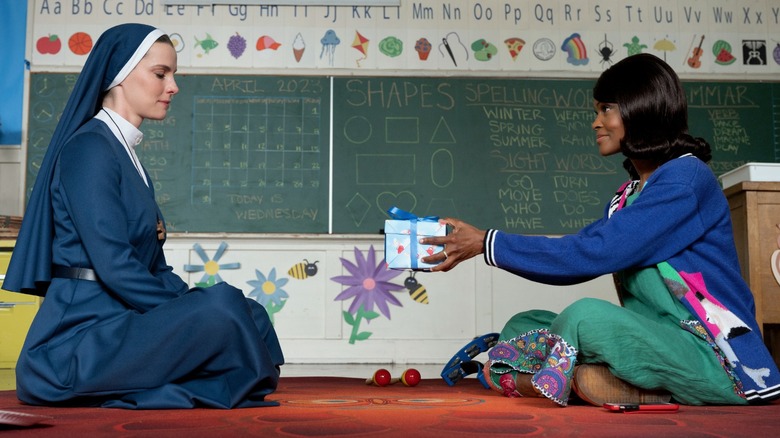Get Wings Or Die Trying: The World Of Mrs. Davis Explained
This post contains spoilers for the first two episodes of "Mrs. Davis."
"Mrs. Davis" leaped onto the TV scene like a fighting nun this week, debuting with a multi-episode premiere on Peacock that introduced viewers to a quirky, algorithm-run new world. The series by "Watchmen" creator Damon Lindelof and "Young Sheldon" writer Tara Hernandez is a total trip. It's a spiritual adventure series led by a nun named Simone (Betty Gilpin), her cowboy-ish companion Wiley (Jake McDorman), and her almost all-knowing confidante Jay (Andy McQueen).
But when it's not focused on Christian mysticism, "Mrs. Davis" is also a sci-fi series, one with a lofty plot that's grounded by an all-too-believable premise. The first episode of the show introduces the titular tech, a powerful algorithm that's able to mobilize global users in an instant to do things like make a sham shave ice stand or stage a kidnapping. Mrs. Davis acts a bit like an AI assistant, but its power seems to know very few limits. In the season premiere, the algorithm offers Simone any wish she chooses – barring bringing back the dead or breaking the laws of nature – in exchange for accepting her quest.
We know what Mrs. Davis is, but why do people follow her? The series is so jam-packed with plot that it's easy to gloss over important details, but in a scene in the second episode, Resistance member JQ (Chris Diamantopoulos) offers a brief but vital rundown of how the world became so obsessed with Mrs. Davis.
Mrs. Davis gives you wings
It turns out, Mrs. Davis operates on a system of rewards and incentives, including some that come at a steep price. The main reward the algorithm offers is deceptively simple: a pair of virtual reality wings that users can wear as a status symbol and badge of honor. The wings, we're shown, appear when a person faces a smartphone camera at the user, sort of like an augmented reality or VR filter. They're not actually real, but what they represent is powerful. In a world where almost everyone follows Mrs. Davis, only the people who it deems worthy through quests and acts of kindness can earn their wings.
The white wing imagery and the idea of "earning" wings certainly parallel Christian ideas of a heavenly afterlife, especially when we take into account that the promise of Mrs. Davis is a world without war or famine. But Mrs. Davis isn't just a modern religion stand-in, it's also a nod to many monetized apps and systems that drive consumers today. Simone compares the wings to a blue check on Twitter (RIP), or a black AmEx card, a status symbol that makes some users superior to others. The tech the show describes might seem far-fetched, but we already live with virtual status symbols today, from NFT profile pictures to Instagram follower counts to in-game rewards in augmented reality games like Pokemon Go.
A dangerous shortcut
Mrs. Davis takes humankind's interest in rewards and reputation and pushes it even further, but the system isn't entirely innocuous. We've already seen that, often, the quests users have to go on for the system aren't acts of kindness so much as larger schemes that cast users as unthinking pawns. And then there's the whole expiration date issue. Expiration dates are a shortcut for users who want to get their wings without actually putting in the seemingly random and potentially lengthy amount of time needed to earn them via quests. According to JQ, these users can get their wings instantly, but doing so requires them to be printed with a tattooed barcode indicating a date at which they must report back to one of Mrs. Davis' pyramid centers. When they do, they'll die, potentially by being incinerated.
The expiration date system is a bit tougher to grasp than the wings system, simply because it seems like an awfully big loss for an immaterial gain. This feels like the app or game equivalent of spending real money on in-game coins or rewards that you could collect daily at a much slower pace, except with much higher stakes. The way JQ explains it, expiration dates have become common because the wings system might actually be a farce. "Step one: convince every user they need wings to be happy, to be respected, to be seen," he says during a presentation to Simone. "Step two: make wings f***ing impossible to get."
The algorithm knows all
JQ describes people who have gone on 1000 quests and still haven't achieved their wings, leading them to think the expiration date is worth it. It's unclear so far whether the algorithm actually shortens anyone's lives or just predicts when they would naturally end, but JQ says some people get "a nice chunk of time" when they apply. Still, this definitely sounds more dystopic than utopic; what's the good in having wings if you won't be around to show them off? What is Mrs. Davis gaining by sending people to their deaths?
Both the show "Mrs. Davis" and the algorithm that gives it its name seem to have plenty more secrets to divulge, so perhaps we'll gain insight into the motivation behind expiration dates as the story continues. Episode three reveals that a key character signed up willingly for fast-tracked wings while in search of some self-worth, and it's easy to believe that if Mrs. Davis were real, plenty of people would do the same.
"Mrs. Davis" is a bizarre series that creatively combines ideas of technology and faith, and if you think about it, they're a match made in heaven (or hell, depending on your perspective). Technological advancement and religious belief are two driving forces in shaping the future, and two topics that foster strong opinions from people who often fall into optimistic or pessimistic camps. Terrible things can be done in the name of faith and technology, but good things can be accomplished, too.
We may not know where Mrs. Davis falls on the spectrum of all-powerful beings until more of the series' mysteries unfold, but for now, we know she's already ushered in a freaky new normal, wings, barcodes, and all. The first four episodes of "Mrs. Davis" are streaming now on Peacock.



